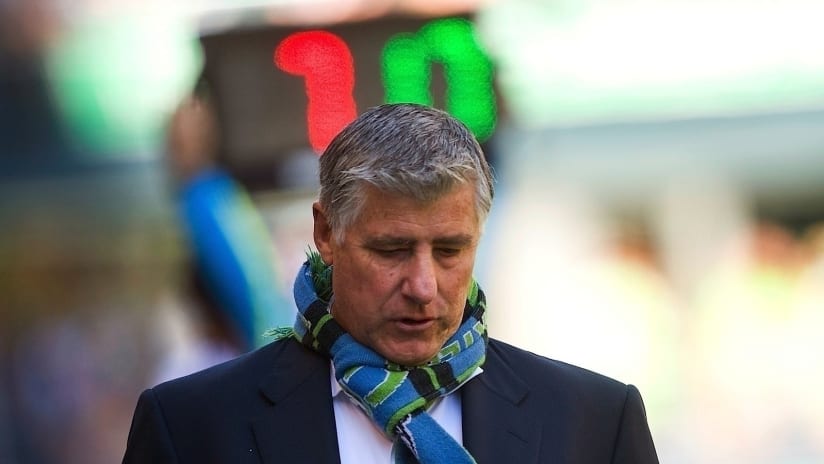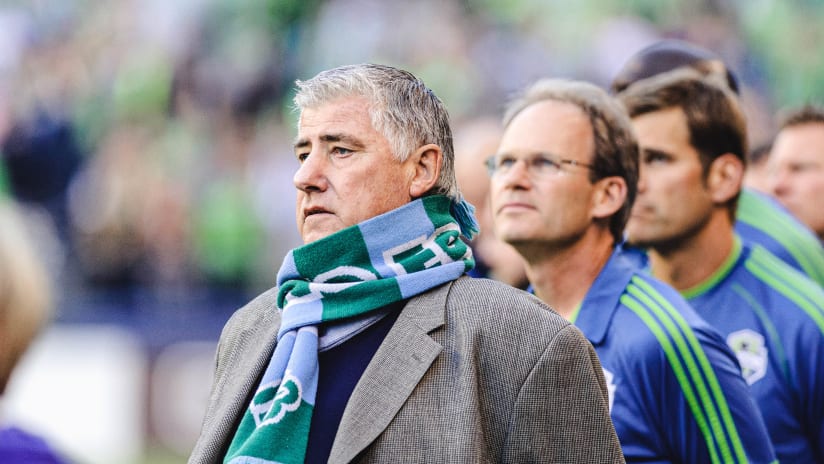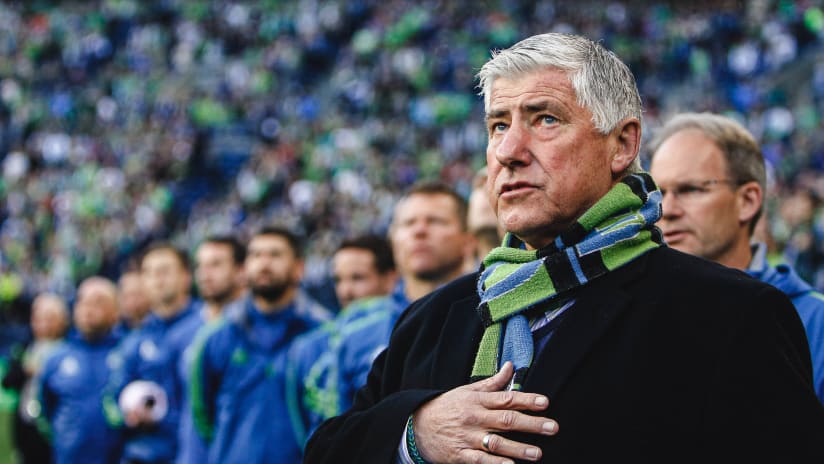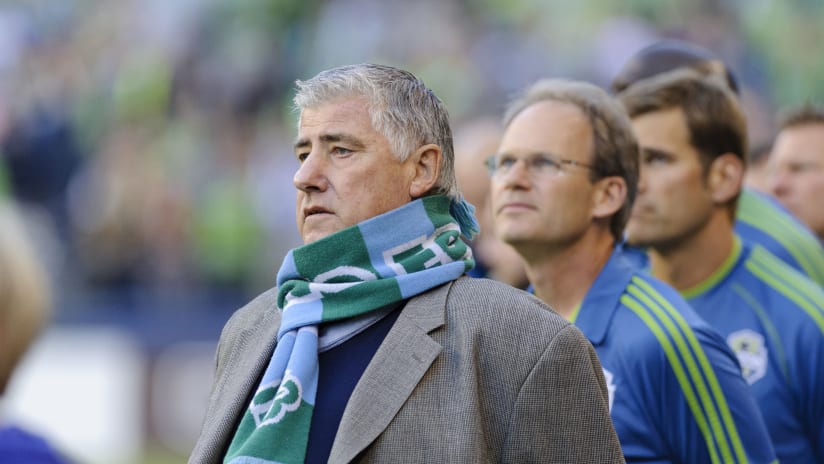The Sounders FC head coach talks about preseason, competitions and injuries in Part One of a two-part series.
The Sounders FC is embarking upon their third MLS campaign Tuesday night at Qwest Field when they take on the LA Galaxy at MLS First Kick. Sounders FC head coach Sigi Schmid sat down for a Q&A to talk about the preseason and his outlook for the 2011 season.
Q: What are your feelings about how preseason went?
A: It went ok. It doesn’t necessarily always reflect how you’re going to do in the regular season. It was good from the standpoint that we got new guys integrated into the group like O’Brian White and Carrasco and Friberg … Tetteh and Ford, too. It was also good because we got to look at different combinations, seeing what combinations fit together and what combinations work. It was also good from the standpoint of fitness. I think our fitness is good. If you look at the game against Colorado as an example, we are a week out from our first game and for our guys to go 90 minutes and still be able to score two goals at the end of the game when they are bringing on fresh legs - I think that speaks well for where we are, fitness wise. So, it was good.
Q: How has this preseason differed from the previous two in Seattle?
A: Obviously the first one was very unique and you can’t compare that to anything. You’re running through a ton of players in a short period of time. That was unique and separate that way. The second year, you’re fine-tuning a bit more, but you’re adding pieces as you go into it. You still are trying to look at how well they fit together as a group. Your first year, you are trying to identify the group and the second year you are really trying to see how that groups fit together. In year three you know what parts fit together and you figure out what you need to add or improve. From that standpoint, they’re all different.
Q: What was the area that you can use as a barometer for how comfortable you will be going into the season?
A: One of the things I wanted to see was an off-season commitment to fitness from the players. I wanted to see who had that fire in their eyes - that desire to take this a step further. Part of that is how you prepare in the off-season. I think for the majority, they prepared a lot more in the off-season than they had in the past. That tells me that they want to take on a bigger challenge. From a standpoint of an improvement of play - you always want to see that, but I also wanted to see an ability to play in games of a physical nature. In preseason, we played Houston, who is a little more of a physical team than some others. We were able to come back from 2-0 down and tie the game 2-2 and we were actually creating more in the first half as well, so I was happy with that. Chicago, with the additions they made, is also a reasonably physical team. Portland, we didn’t come away with the result, but I was happy with how we played. And all of those teams area a little more physical than Dallas is or Salt Lake is. That was the next important step for me.
Q: How much has losing in the first round of the playoffs changed the approach this season?
A: Being a soccer purist, you want to say that the team that wins the Supporters’ Shield is the best team in the league. But if you ask the fans who follow the league in this country, they can probably tell you the last eight MLS Cup winners, but they can’t tell you the last eight Supporters’ Shield winners. Success in this league, as is viewed by the soccer public, is measured by who wins MLS Cup. At the end of the day, MLS Cup is … a cup. If you go to Spain, you will see Barcelona and Madrid winning 75 percent of the championships in the last 20 years, but they haven’t won 75 percent of the Spanish Cup championships. It’s the same in Germany and the same in England. It’s hard to win the Cup two years in a row or three years in a row because it is a knockout competition. So that’s something I’m actually proud of with this team. To win the US Open Cup two years in a row is hard to do. Now in MLS, winning the Supporters’ Shield would be great, but winning the Supporters’ Shield would be great, but the Supporters’ Shield winner hasn’t won the Cup in the last two years - they’ve only done it twice in the last ten years or so and that was LA in 2002 and Columbus in 2008. I would love to do it again, but it’s not necessary to win the MLS Cup. For us, what’s important is to make the playoffs. If we can win the Supporters’ Shield, great. But we want to be tougher mentally when we get into the playoff competition and to find a way to raise our game when we get into that competition.
Q: Do you find yourself needing to scale things back at different moments because of how many competitions and how many games you will be playing?
A: Sometimes when you try and win every competition you’re in, you’re probably going to fail at some because guys are just going to be burnt out. I guess I don’t know any other way to do it. It’s tough for me to say we are going to focus on one competition and not another one. Everything is important. If you do go in there, it can give the players the rationale that they don’t think they have to try because the club doesn’t put as much emphasis on a competition. Then you need them to try in a game and they might forget how to try. We aren’t scaling back competitions, but we may have to be smart about the minutes that we are giving players and it may have to be more of a mix at times. If we play five games in two weeks, maybe some guys will play two of those games and others will play three or four, but nobody’s playing all five games. So those are things that we’ll look to do, where we will find a mix sometimes that isn’t a pure reserve team or a pure first team. If you put Friberg on the field instead of Evans, your game hopefully doesn’t change much or miss a beat. If you put Carrasco on the field instead of Alonso, has your game lost much? If you put O’Brian White on the field or Ianni on the field, does your game change? The more guys we can do that with - the Germans have a saying that you can dance at all the marriages. We want to take part in all the marriages that are taking place.
Q: There are a lot of different competitions. How difficult is it going to be, with all the talent and depth on this team, to make sure guys are getting the playing time they need?
A: It is a good problem to have, but it’s always going to be frustrating. As a young coach, I tried to be like Nostradamus and look ahead for a couple of weeks and figure out where I was going to play guys and tell the players the plan so they could stay in focus. Invariably, when you do that, somebody gets hurt and everything gets thrown out the window. As an older coach I’ve learned to keep those thoughts to myself because the second a player doesn’t think he’s going to play, the guy in front of him gets injured and then he has to play. But that division of playing time and keeping everybody happy is always a difficult thing. You know the starters are going to be happy and you have to touch base with the guys who aren’t starting to see how they are feeling. When you add ten official reserve games with 34 regular season games and eight games in Champions League and four or five in the Open Cup, that’s 57 official games. You can’t play that many with just 18 players, so guys are going to get opportunities. Some might get four or five. Someone else will get 25. Someone else will get 40. There are enough games to go around, sometimes we just have to be patient and as a coaching staff we have to keep in touch with the guys who, at the moment, aren’t playing as much.
Q: Do you feel like this team is better equipped to handle an injury than last year’s team?
A: Yeah, definitely. That is one of the things we wanted to improve upon. Especially in the areas we really got caught short. When Nate Jaqua got hurt at the start of the season, we didn’t really have a forward with size. Brining in O’Brian White and already having Nkufo here and Jaqua - we now have three forwards with some size. We wanted to have more depth in the middle of midfield because the loss of Sturgis kind of thinned that out. Now with Carrasco and Friberg we have that. With the return of Kennedy in the middle of the defense, we have that depth too. When you look at the flanks, Neagle’s improvement after being away for a year and the growth and development of Montano and Fernandez now being here from the beginning we have more depth in the wide areas. I think we’ve improved ourselves in all of those areas.
Check back on Tuesday for Part 2 of the interview, where Schmid will talk about Kasey Keller, Fredy Montero and Steve Zakuani, and will tell us what has him excited for the 2011 season.







